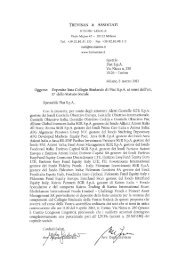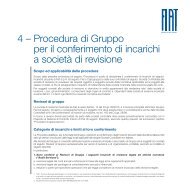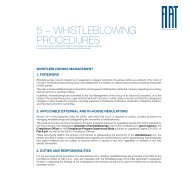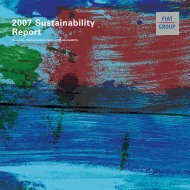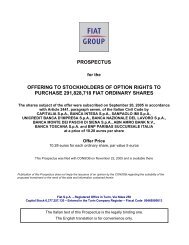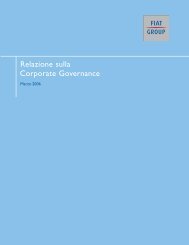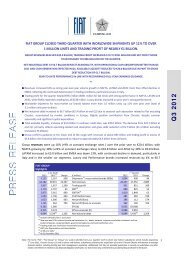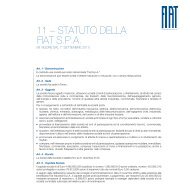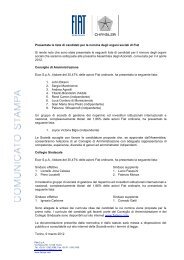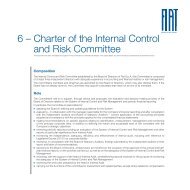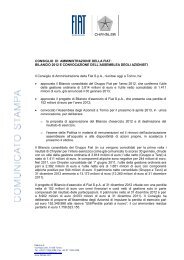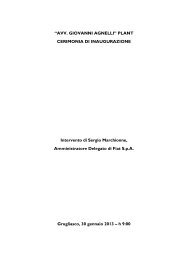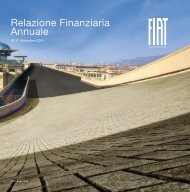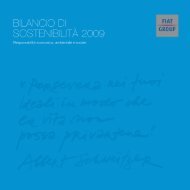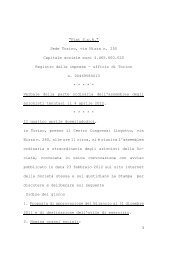annual report - FIAT SpA
annual report - FIAT SpA
annual report - FIAT SpA
Create successful ePaper yourself
Turn your PDF publications into a flip-book with our unique Google optimized e-Paper software.
MAIN RISKS AND UNCERTAINTIES TO<br />
WHICH <strong>FIAT</strong> S.P.A. AND <strong>FIAT</strong> GROUP<br />
POST DEMERGER ARE EXPOSED<br />
Following is a brief description of risks and uncertainties that could potentially have a significant impact on the activities<br />
of Fiat Group post Demerger. Other risks and uncertainties, which are currently unforeseeable or considered to be<br />
unlikely, could also have a significant influence on the operating performance, financial position and future prospects of<br />
Fiat S.p.A. and Fiat Group post Demerger.<br />
Risks associated with general economic conditions<br />
The Group’s earnings and financial position are influenced by various macro-economic factors – including increases or<br />
decreases in gross national product, the level of consumer and business confidence, changes in interest rates on<br />
consumer credit, the cost of raw materials and the rate of unemployment – within the various countries in which it<br />
operates.<br />
For example, the global economic recession in 2008 and the first half of 2009 had a negative impact on the Group’s<br />
earnings. Weak economic conditions resulted in a significant decline in demand for most of the Group’s products. In<br />
2010, demand levels for the automobiles business in Europe also reflected the absence of significant measures<br />
previously put in place by major governments and monetary authorities. In general, the sectors in which the Group<br />
operates have historically been subject to highly cyclical demand and tend to reflect the overall performance of the<br />
economy, in certain cases even amplifying the effects of economic trends. Given the difficulty in predicting the<br />
magnitude and duration of economic cycles, there can be no assurances as to future trends in the demand for or<br />
supply of products sold by the Group in any of the markets in which it operates.<br />
Moreover, certain major economies are still in recession or have recently suffered periods of low growth or economic<br />
stagnation. These conditions or the return to economic recession in markets that have recently recovered could<br />
ultimately affect the industrial development of many businesses, including those of the Group. There can be no<br />
certainty that measures taken by governments and monetary authorities will be successful in re-establishing the<br />
conditions necessary for sustainable economic growth. As such, uncertainty remains as to the global economic outlook<br />
and some national economies could experience extended periods of slow economic growth or recession.<br />
Additionally, even in the absence of slow growth or recession, other economic circumstances – such as increases in<br />
energy prices, fluctuations in prices of raw materials or contractions in infrastructure spending – could have negative<br />
consequences for the industries in which the Group operates and, together with the other factors referred to previously,<br />
could have a material adverse effect on the Group’s business prospects, earnings and/or financial position.<br />
Risks associated with financing requirements<br />
The Group’s future performance will depend on, among other things, its ability to finance debt repayment obligations<br />
and planned investments from operating cash flow, available liquidity, the renewal or refinancing of existing bank loans<br />
and/or facilities and possible recourse to capital markets or other sources of financing. Although the Group has<br />
measures in place to ensure that adequate levels of working capital and liquidity are maintained, any declines in sales<br />
volumes could have a negative impact on the cash-generating capacity of its operating activities. The Group could,<br />
therefore, find itself in the position of having to seek additional financing and/or refinance existing debt, including in<br />
unfavorable market conditions with limited availability of funding and a general increase in funding costs. Any difficulty<br />
in obtaining financing could have a material adverse effect on the Group's business prospects, earnings and/or<br />
financial position.<br />
Risks associated with Fiat S.p.A.’s credit rating<br />
The ability to access the capital markets or other forms of financing and the related costs are dependent, amongst<br />
other things, on the Group’s credit ratings. Following downgrades by the major rating agencies in the first quarter of<br />
2009, Fiat S.p.A. is currently rated below investment grade with ratings on its long-term debt of Ba1 (with negative<br />
outlook) from Moody’s Investors Service, BB+ (with negative outlook) from Standard & Poor's Ratings Services and<br />
BB+ (with negative outlook) from Fitch Ratings Ltd.<br />
On 23 April 2010, following Fiat's announcement of the proposed Demerger, Standard & Poor's placed Fiat S.p.A. on<br />
CreditWatch with negative implications. The CreditWatch status was confirmed on 1 October 2010 and the rating<br />
agency is currently reviewing the Company’s status. On 21 July 2010, Moody’s Investors Service placed Fiat S.p.A.’s<br />
Report on Operations Main risks and uncertainties to which Fiat S.p.A. and Fiat Group<br />
post Demerger are exposed<br />
22



